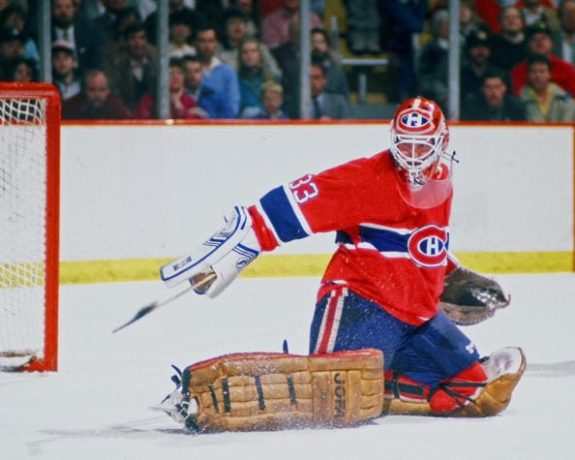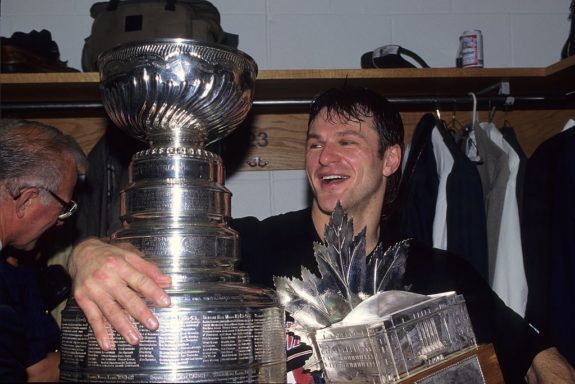When he donned the bleu-blanc-rouge on opening night of the 2018-19 season, Jesperi Kotkaniemi tied Claude Lemieux as the third-youngest Montreal Canadien in history, at 18 years, 89 days old. The native of Pori, Finland and third overall pick in the 2018 draft also made history by becoming the first NHL player born in the 2000s.
Kotkaniemi registered an assist and two shots on goal in a 3-2 overtime loss to the Toronto Maple Leafs. “I don’t think he looked out of place,” said head coach Claude Julien. “If you want to win hockey games, you have to put players on the ice who are capable of making plays and he’s one of those guys. The guy I saw tonight, it was his first experience and I thought he did well. I know he’s one of those guys who’s going to adjust himself as he’s done since the beginning. It was his first real test against a solid NHL team and I thought he answered the call.”

Although it’s a younger, faster NHL, Montreal’s slim Cup hopes cannot rest on Kotkaniemi’s slender shoulders this season. But if fans are looking for reasons to believe, two of the three precocious players in team history became Stanley Cup champions, and Kotkaniemi’s career is already longer than the third.
Olivier Michaud (18 years, 46 days)
The youngest on the list played all of one game in the NHL. On Oct. 30, 2001, Olivier Michaud lived the dream of many young Quebecois goaltenders. The native of Beloeil, Quebec signed as a free agent on Sept. 18, 2001, and was an emergency call-up from the Shawinigan Cataractes with Jose Theodore and Jeff Hackett both injured.
Michaud relieved third-stringer Mathieu Garon with 18 minutes left in a game against the Edmonton Oilers and stopped all 14 shots, finishing his NHL career with a perfect 1.000 save percentage.
Michaud won a silver medal with Team Canada at the 2002 World Junior Championships and went on to play in the AHL and ECHL. He last saw action with the St. Jean Chiefs of the (Quebec) North American Hockey League in 2007-08 and is now a goalie coach.
Mario Tremblay (18 years, 72 days)
The 12th overall pick in 1974 by the Canadiens, Mario Tremblay had 39 points and 108 penalty minutes in 63 games in 1974-75, and was part of four straight titles between 1976 and 1979, scoring the Cup-winner in 1978.
“The Bionic Blueberry” was solid at both ends of the ice and when his gloves dropped. He had 584 points and 1,043 penalty minutes in 852 games over 12 seasons, all with the Canadiens, before suffering a career-ending shoulder injury a few months before the Habs lifted the 1986 Stanley Cup.
He is remembered for L’Affaire Roy, when, as head coach, Tremblay left superstar goaltender Patrick Roy in for nine goals against the Detroit Red Wings on Dec. 2, 1995. The embarrassment prompted Roy to walk past Tremblay on the bench and declare to president Ronald Corey that he’d never play for the team again. Four days later Roy was traded to the Colorado Avalanche, where the future Hall of Famer won two more Stanley Cups. It was a franchise-altering trade that took the Canadiens years to recover from.

Tremblay coached the Canadiens for 159 games over two seasons with a record of 71 wins, 63 losses and 25 ties. Now a broadcaster, he courted more controversy in 2015 when he was arrested for driving under the influence and compared the police officer’s poor judgment to then-Canadiens defenseman P.K. Subban, and again in 2017, after declaring on a radio program that Alex Galchenyuk had sought treatment for substance abuse.
Claude Lemieux (18 years, 89 days)
Tremblay’s swan song coincided with Claude Lemieux’s coming out party in 1986. Drafted in the second round in 1983, Lemieux played in eight NHL games in 1983-84, followed by one the next season.
With only 19 games over three seasons under his belt when the 1986 playoffs arrived, Lemieux was still considered a rookie and became the first rookie to score in overtime of a Game 7 when he potted the winner at 5:55 of the extra frame in the Adams Division Final against the Hartford Whalers. He finished the playoffs with 16 points, 68 penalty minutes, and a trip around the ice with the Cup hoisted above his head.
Lemieux played a total of 281 games over seven seasons in Montreal before being traded to the New Jersey Devils for Sylvain Turgeon. He suited up for four more teams and retired in 2009 after 1,215 NHL games, 789 points, and 1,777 penalty minutes. Built for playoff pressure, Lemieux had 158 points in 234 postseason games, including 19 game-winning goals. He played on four Stanley Cup champions and won the Conn Smythe trophy in 1995 with the New Jersey Devils.

Lemieux is also part of one of the bloodiest memories in postseason history. Playing for the Colorado Avalanche, he raked Kris Draper’s face down the boards in Game 6 of the 1996 Western Conference Final against the Red Wings, caving it in and igniting a fierce rivalry. The Avalanche, with Roy in net, went on to win the Cup in the team’s first season after moving from Quebec City.
The New Lemieux or Tremblay?
After his first four NHL games, the future number one center has already outlasted Michaud and he may have more in common with his gritty predecessors than scouts anticipated. Kotkaniemi had earned six penalty minutes in his first three games to put him on an early pace to beat Lemieux’s career-high 156 penalty minutes in 1986-87, but after a penalty-free fourth game, he’ll now equal Tremblay’s most sinful season of 123 minutes in 1980-81.
The Habs’ faithful might prefer that the similarities between Kotkaniemi and Lemieux lie in clutch playoff performances and a handful of Stanley Cup rings.